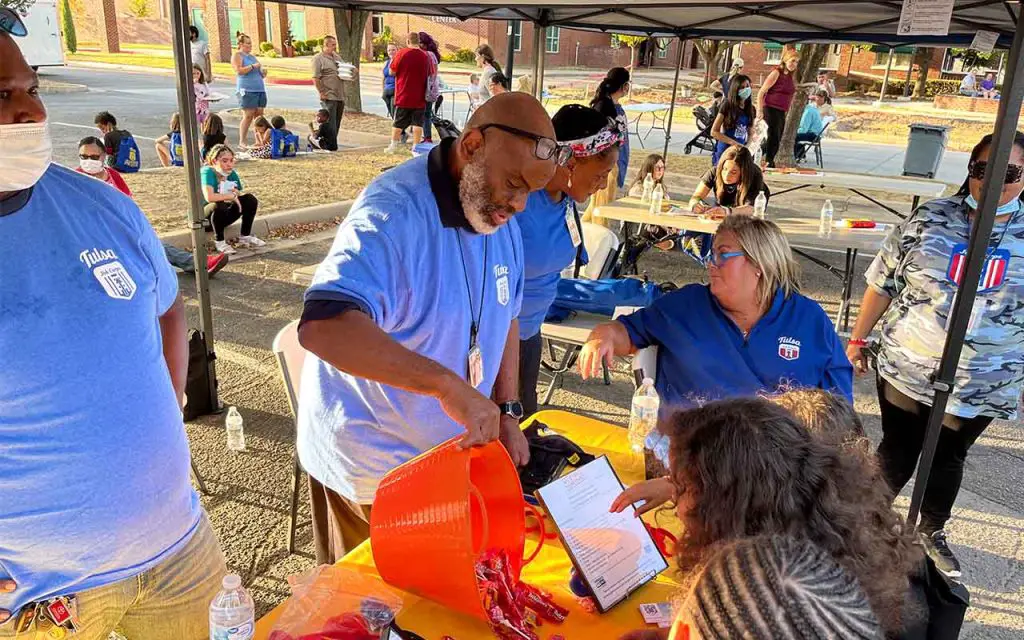
Common Ground… it’s an interesting phrase we toss around daily, meaning something that can be agreed upon. But what happens when someone digs below the surface of that ground? One Tulsa native decided to do just that. And what he discovered was the fertile ground where people could plant seeds that would not only draw others to common ground but produce a solution to a growing need common among all communities.
All Things Are Possible
“It’s a sense of calling to service,” Hanson says of this mission, which is what prompted the creation of Food on the Move. It was a decision to engage and help strengthen his community, he added. Being fortunate enough to be able to pursue his passion as a musician and artist while growing up in Tulsa gave him the unique perspective of those few who can turn their passion into their day job.
In a sense, this made him “dangerous” because he knew that what should be unlikely had not rung true in his experience. In other words, the unlikely happened once… so it will happen twice. And it has. It was a positive attitude that impossible things could be accomplished with determination. But where to begin? He needed a mission. And he found it in a mentor.
Food on the Move
The seed that would become the non-profit organization Food on the Move would come from a former US ambassador. He was a man who Taylor respected, someone who had made a difference through his own service to others and the United States. Edward J. Perkins was a teacher at OU when he and Hanson became acquainted.
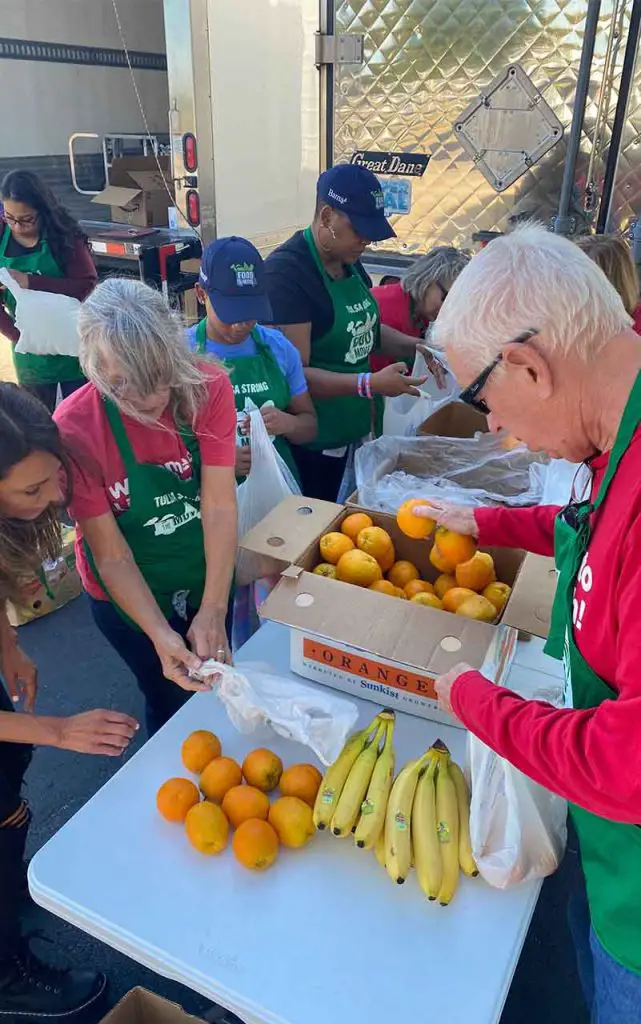
An educated black man who had experienced and overcome racism and segregation in his own life, Edward J. Perkins not only rose to a successful career in diplomacy but played a pivotal role in ending the policy of discrimination and segregation in South Africa as the US ambassador from 1986 to 89.
His courage to stand for what is right rather than what is expected would have a significant impact on Hanson. But it would be Perkins’ willingness to get in the trenches, as it were, and fight the good fight that would leave a lasting impression on Hanson. It was the message that possibilities are created by those who believe nothing is impossible. That message exemplified Perkins’ service to the United States and became the inspiration for Hanson to honor his life with an act of service all his own. “I wanted to build bridges to connect people, not walls to separate them,” Hanson said.
This is what Perkins had done. And ironically, it would be advice from Perkins that set the course for his chosen act of service. That same act now grows in the common ground among Tulsans. One simple word, “food,” was the seed that Perkins and Hanson planted that day. When Taylor asked him how he could honor his life, Perkins’ response became the vision that is now Food on the Move. The implication is that it all begins with food, the common necessity that all humankind requires, as Perkins believes. And inspiring someone else to help everyone with what they needed was how this man of service wanted to be honored.
Sowing Seeds
And so it began, small of course, but with vigor and a new and different attitude. Unlike other organizations that throw money at the results created by problems in society, this act of service was about using knowledge to correct it at the root. It was the same attitude that had transformed South Africa from an apartheid society, and it would be the same one for this endeavor, a transformational one, Hanson explained. It had to be life-altering.
It would be a new approach to providing food to those who needed it most. It was a ‘get in the trenches approach and plant seeds while down there’ approach. It was 2014, and Hanson began his act of service by first meeting with people in the community and posing the question of how Tulsa could become a stronger community using food. Talking with food banks, health departments, civic leaders, and other non-profits, he learned that there is a societal misconception and that hunger is not only among the homeless population. Nor can it be alleviated with just soup kitchens.
Hunger is a community-wide problem that affects working families who are not typically viewed by others as “in need.” And what became most evident was that money is not always the problem as to why people do not have access to healthy food. It became clear that many people simply didn’t have convenient access to grocery stores, healthy foods, and produce. This was the invisible enemy. “We devised an idea.
We decided to start by bringing the food to those areas where food was not readily available—in other words, moving the food to those areas known as food deserts. Food on the Move was created because of a need that most didn’t even recognize. And so, a new vision had to be and was born. The events of distributing food to these food deserts serve two purposes, according to Hanson.
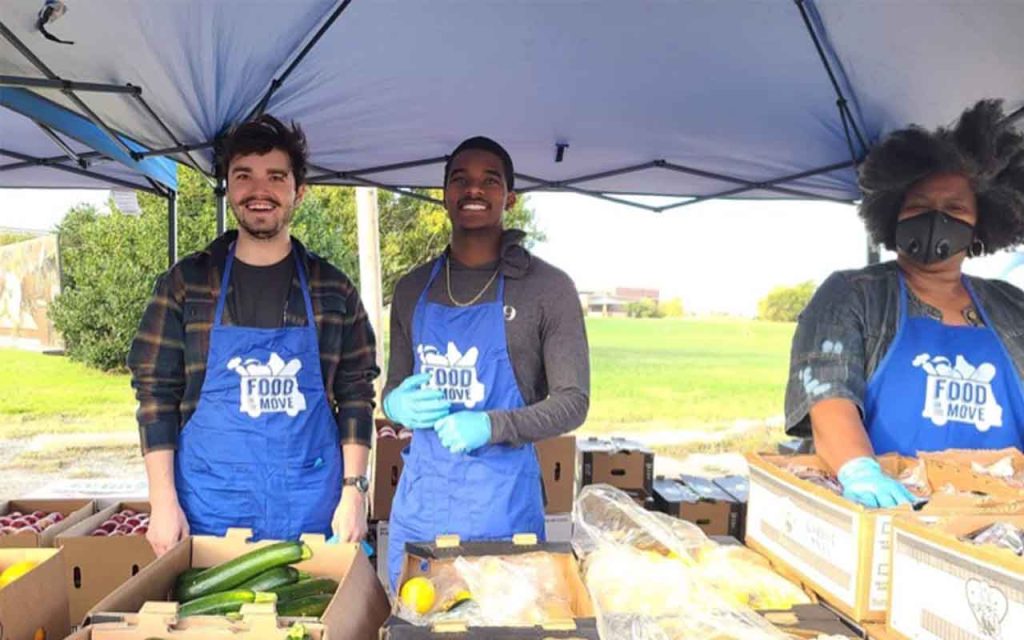
First, it provides healthy food immediately, such as fresh produce and other such necessary foods which are lacking in many homes, and provides meals to those who have very little at all to eat. Secondly, it is to learn from those who are in need. It is a mission to understand what needs to happen for these people to no longer require help. “It is to teach them to fish,” as the adage goes. Food is the beginning. The middle is to learn from these people what they need to transition from the side of the table needing food to the side that is passing it out. And the end is to eradicate food deserts.
Teach a Man to Grow
And in the middle is where Hanson and Executive Director for Food on the Move, Kevin Harper thrive. They realized early on that an end to food deserts is in the knowledge to change those from deserts to gardens. Asking questions, listening, and innovation became key to their mission. And so, they began planting seeds in the trenches with new innovative ideas. One of the most exciting is its quest to teach others to grow their own food.
Anyone who grows gardens begins to understand the power of nature and the bounty one seed can provide. It’s exciting to witness the transformation from seed to crop, to watch them develop into an edible miracle. The initial results have been incredible. Through an education program begun last year, children are witnessing that miracle and learning that the power to produce healthy and inexpensive food is not only possible but fun.
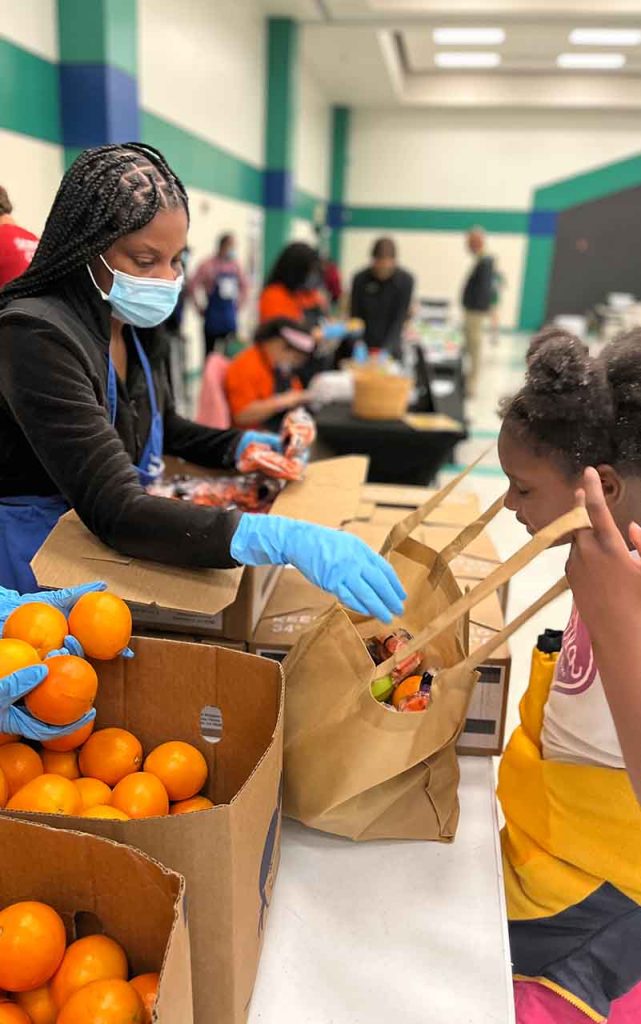
“When we began, we thought that growth would be and could be a key part of the transformation that is needed,” Hanson said. However, he admitted how that was going to play out wasn’t quite clear. It was, after all, a learning experience for Hanson, Harper, and others involved. Hanson further explained that in society today, most have lost touch with the art of growing.
It is easy for those who do not live within food deserts to drop by the grocery store and pick up salad ingredients. So, in essence, a skill set is lost to the convenience of easily obtainable produce for many. Rediscovering our lost connection to growing our own food will certainly play a large role in eradicating food deserts, Hanson said.
This is certainly a goal within the organization to bring back that lost connection on an individual level. But realistically, it is only a part of what needs to happen. This realization has also brought about a long-term plan of teaching it on a generational level so large amounts of food can be grown by a new generation of growers throughout the year.
This can be done now with the help of advancements in technology for indoor growing urban farms. They began with a pilot program at Monroe Demonstration Academy. And it yielded, without maximization, over 400 pounds of produce last year alone. Fresh food is all grown by the students! This is an investment that Food on the Move believes can bring about its long-term goal of transformation. The initial grow operation for the inside operation cost was $30,000, with additional outside grow beds installed adding another $10,000. The money was donated by several supporters of the organization.
Food on the Move’s initial results are a clear sign they are growing in the right direction. In addition to helping in food desert areas, teaching a generation to grow local food on this scale opens the door to future commerce when these young growers learn that this is a transferable skill to adulthood. Those who grow up in food deserts and learn the value of growing can, and hopefully, will utilize these newfound skills to market what they grow in the future in and out of food deserts.
They are currently only working with Tulsa Public Schools to create the framework for a curriculum. But eventually hope it will be adopted statewide to create a learning environment that teaches new generations the power of growing their own food and creating commerce, all the while eradicating food deserts.
Volunteering for Change
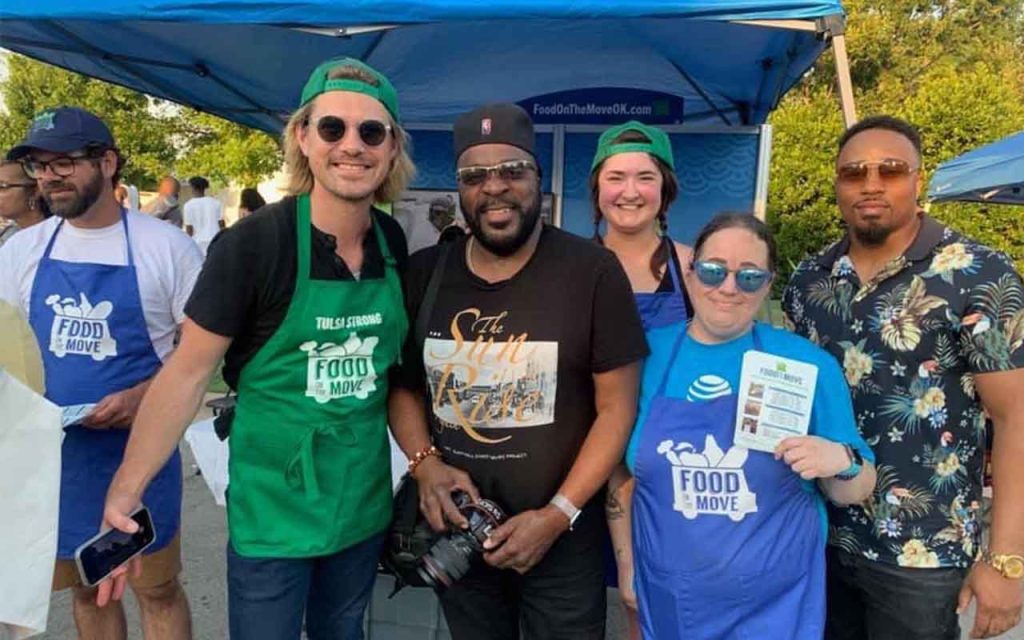
Food on the Move is a volunteer-driven organization where locals in the community volunteer their time to help those in need of food. What is so rewarding for Hanson, Harper, and others who run the organization is how the message has spread into the lives of those volunteering. Even those who started out with simple tasks such as handing out fliers have become heavily involved in other aspects of the mission.
And that is certainly something that funnels down from the leadership. In all types of weather, Hanson and Harper will be right alongside volunteers distributing food, passing out flyers, and gathering information as to how they can further eradicate food deserts and help people become more successful in their lives.
It’s an impressive sight to see, a seemingly endless line of people driving up and being greeted by their neighbors as they are given boxes of fresh food. It’s easy to see why volunteerism keeps rising once you witness the true spirit of giving portrayed through a Food on the Move event.
Most know of Taylor Hanson through the fame and success of he and his brothers, Isaac and Zac’s band Hanson, which they formed in the early 1990s. The trio has undoubtedly racked up a following and continues creating music for loyal and new fans alike. And though Taylor Hanson has earned tremendous commercial success over his career, he has transformed his desire to grow something equally as universal as the music he creates. It’s something everyone is destined to become a fan of a mission to make sure no one in Tulsa goes hungry.

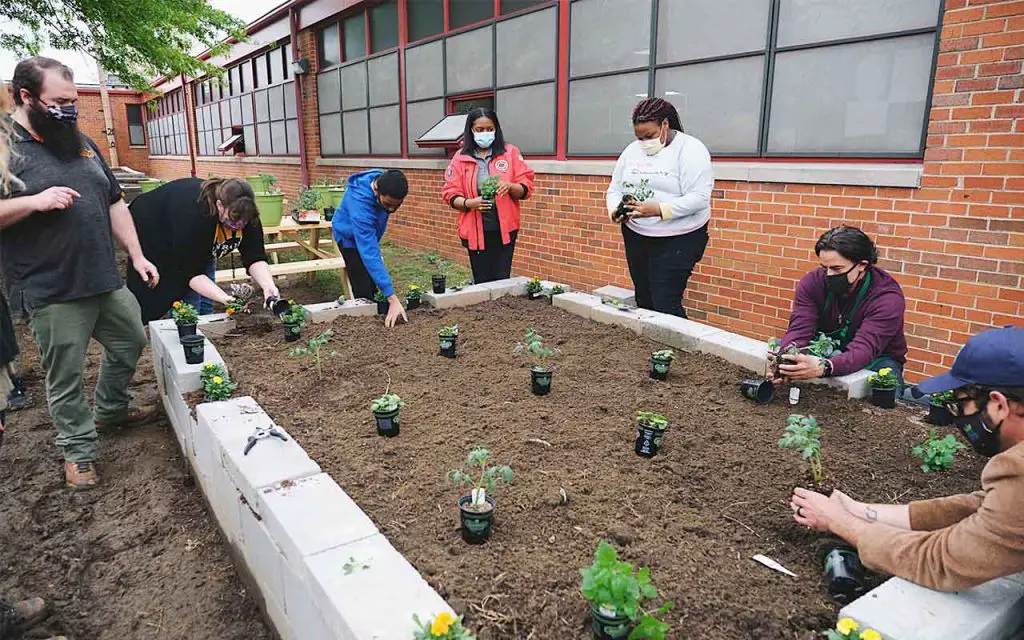

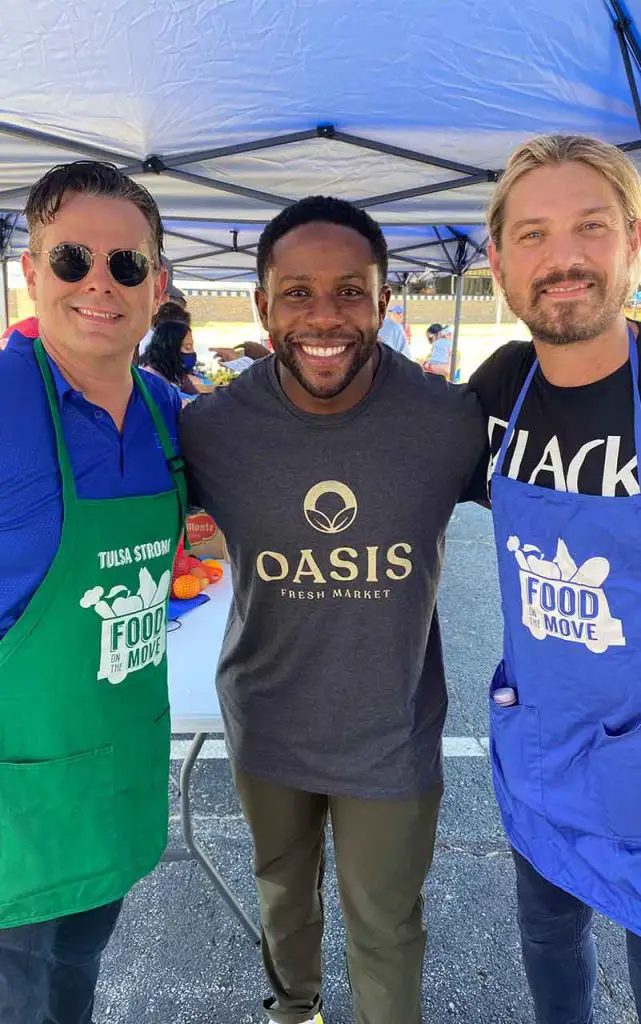


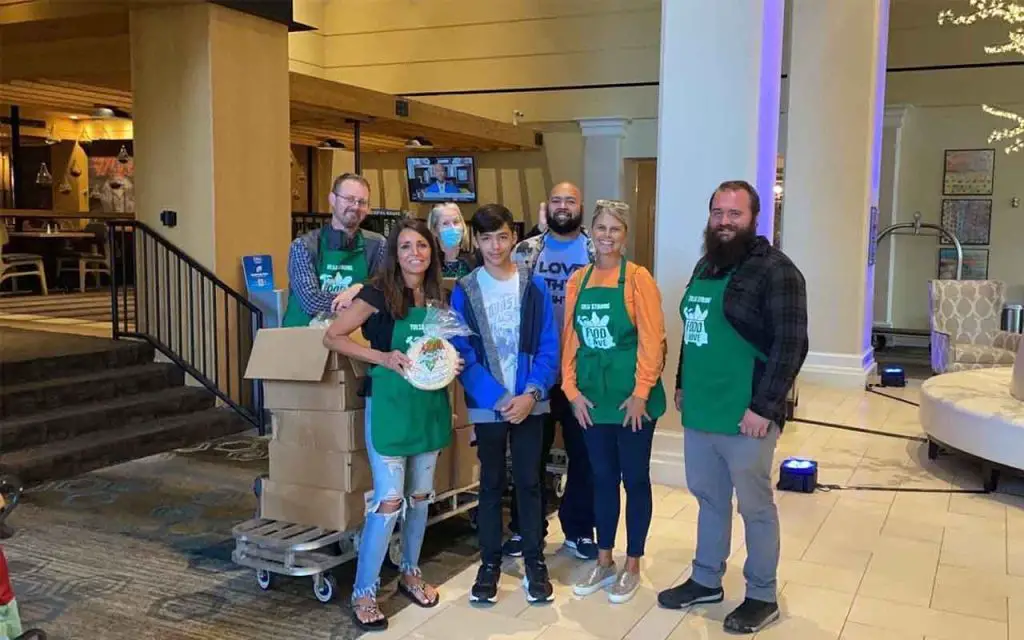



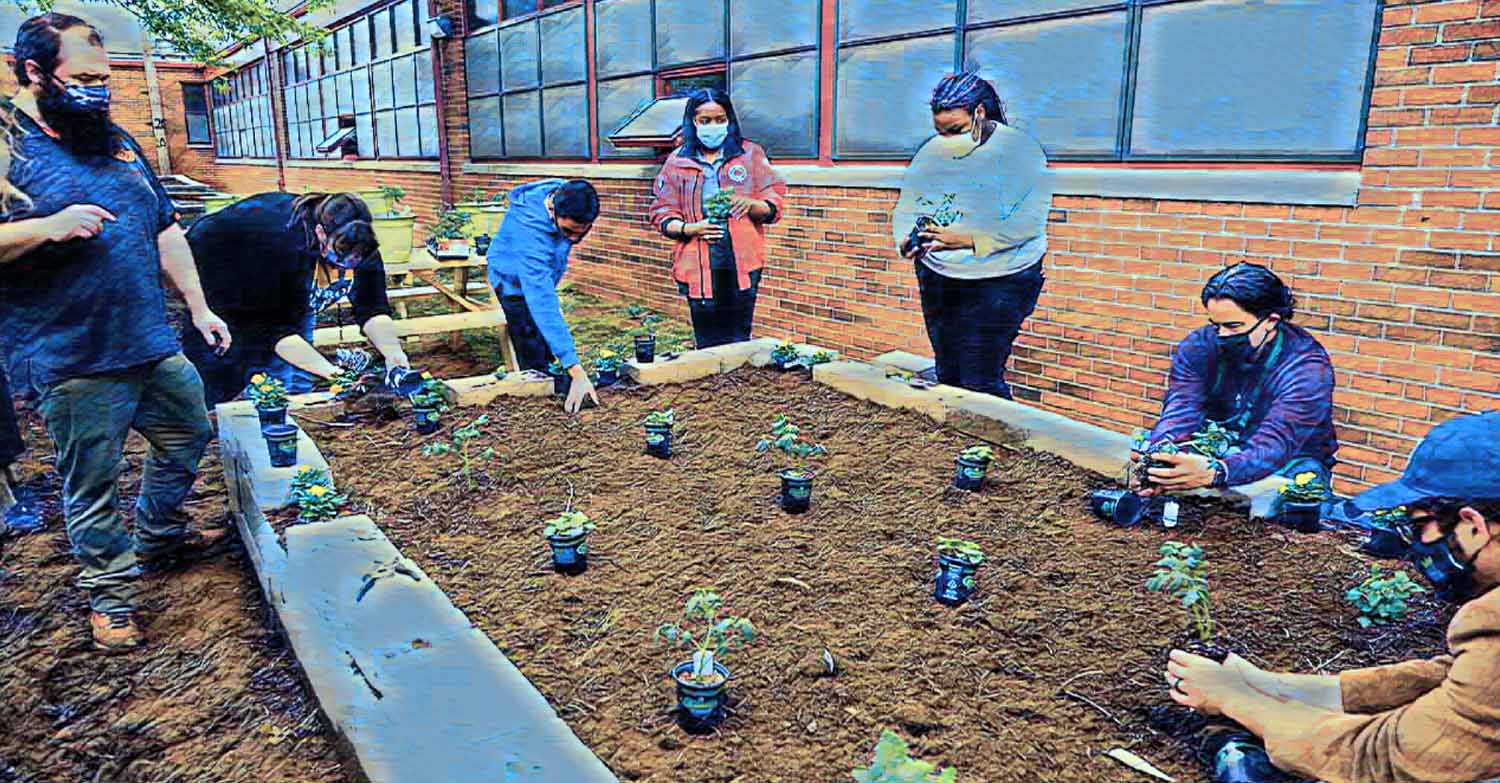


Fantastic article! Great reporting. Jennifer Wingfield is the greatest person ever!!!